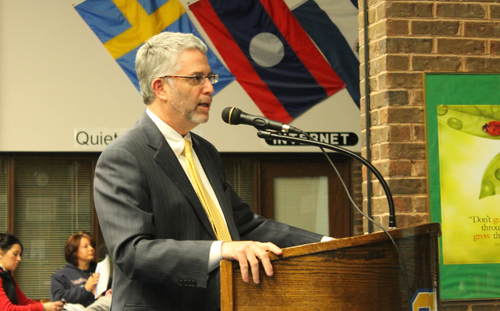SWR supe warns residents of what might happen should budget fail

The Shoreham-Wading River district superintendent presented a contingent budget Tuesday night that must be implemented if voters do not pass the district’s proposed budget in May.
Under state law, the district will be required to keep the tax levy at it’s current level if the budget fails, meaning an additional $830,000 will have to be cut from the budget. Those cuts would come from eliminating three elementary school teaching positions, the high school spring play and fall music productions, all equipment purchases and all junior varsity athletic programs.
The district would add middle school intramurals to partially make up for the 46 athletic teams that would have to be discontinued.
Under the non-contingency budget proposed by superintendent Steven Cohen, the district would be able to stay below the state mandated 2 percent tax levy cap for the 2012-13 school year, while not reducing teaching staff or programs.
Dr. Cohen said employees’ salaries and benefits will cost about $46 million, nearly 75 percent of the $62.4 million overall budget next year. But the district will not have to cut staff next year because Shoreham-Wading River will pull about $3.75 million from its reserve fund as tax relief, about double the amount from last year.
The reserve funds will be tapped into once the fund balance — the unspent surplus from the previous years’ budgets, resulting from items such as reduced heating costs in a warm winter — is depleted, officials said.
School officials said more than $16 million remain in the various reserve funds.
According to Dr. Cohen’s presentation, employee salaries will rise by $1.33 million, or 4.52 percent next year due to contractual obligations and negotiations. This change represents 55.91 percent of the total change in the 2012-13 budget. Employee benefits will rise by 1.15 percent, or about 7.6 percent of the total change in the budget.
Dr. Cohen said rising health care premiums “are the main drivers of increases in employee benefits.”
Because staffing levels will remain the same, Dr. Cohen said district schools should have roughly the same class sizes as this year: between 18 to 25 students per class in the primary schools, 20 to 25 students per class in the intermediate school, and 28 or fewer students per class in the secondary schools.
The school board also discussed how to spend $135,000 that would bring it right up against the planned 1.75 percent tax levy.
About $6,700 would be given to each elementary school to focus on funding enrichment programs, like “Arts in Education” assemblies and programs.
The remainder would be placed in a capital fund budget line that would be created for 2012-13. The money in that line would be used for building repairs and upkeep needed around the district, school officials said. State aid could be provided for between 30 and 34 percent of all repair costs.
Proposition 2, a “health and safety” plan to use $1.14 million for playgrounds, retaining walls, site work and security cameras, was also brought up at Tuesday night’s meeting. The money for the upgrades would come out of savings from a 2009 health and safety proposition, for which the resulting work came in under budget. The district is asking voters to approve reallocation of those funds to other projects.
An audience member asked the board why there wasn’t a proposition to return the money to taxpayers as tax relief. Dr. Cohen said the money couldn’t be refunded as a check in the mail, as happened with a recent tax correction from Brookhaven and Riverhead towns.
Glen Arcuri, district director of finance and operations, added that it was also impossible to put up a proposition with the option of returning the taxed money that wasn’t spent through the health and safety bond, because if that proposition passed along with Proposition 2, the district would have passed two conflicting propositions.








